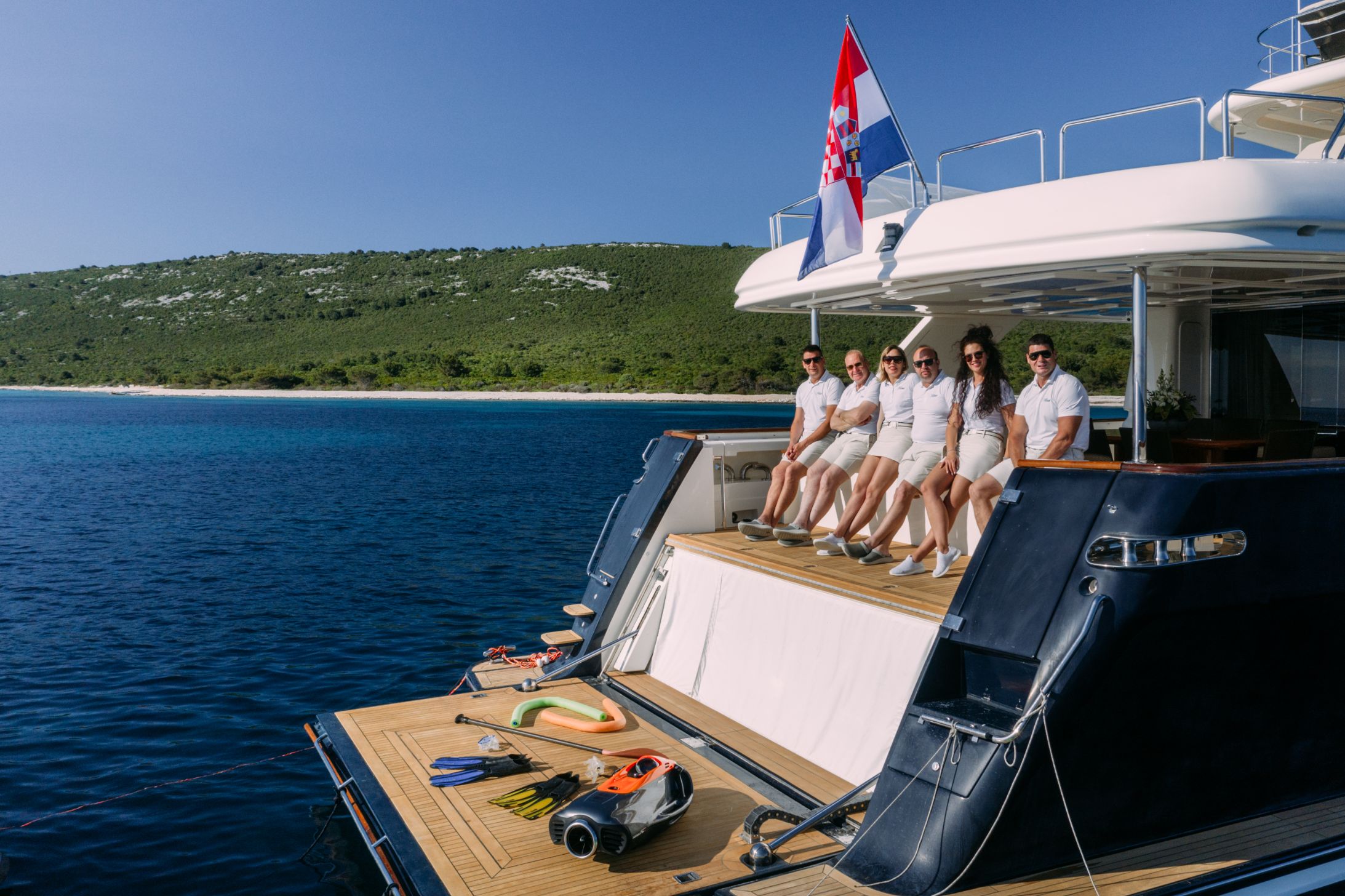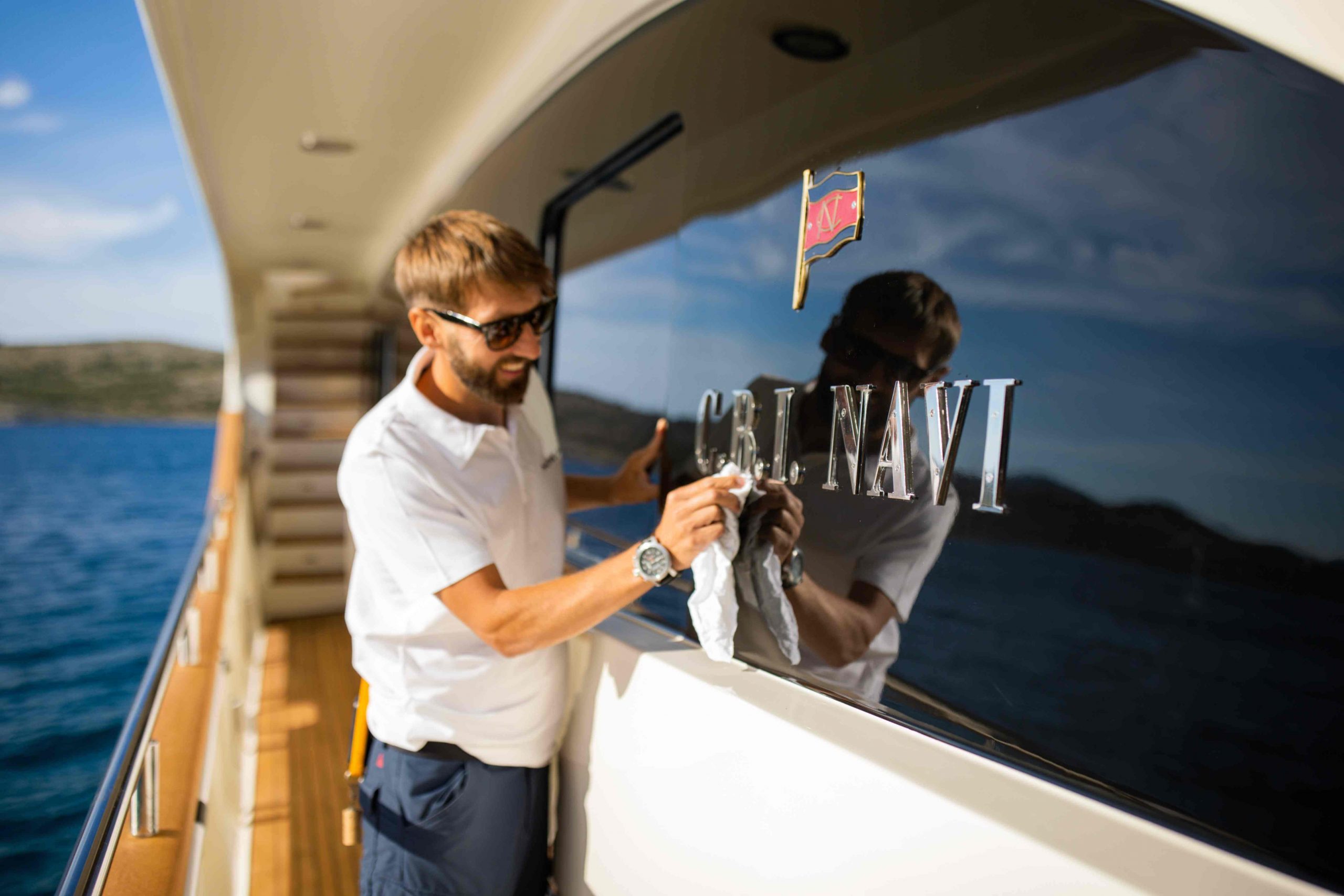Is Below Deck Bad for Yachting?
Photo credit to: @thecrewbuilder
But as Below Deck has grown in popularity, so too has the debate about whether Below Deck has done more harm than good for the yachting industry.
Yachting is an elite world—one defined by precision, professionalism, and, above all, discretion. Traditionally, it has been an industry that prides itself on quiet luxury and military-like order.
However, with Below Deck’s increasing influence, many argue that the romanticized depiction of crew relationships, coupled with sensationalized drama, is tarnishing the reputation of yachting and setting unrealistic and unprofessional standards for aspiring yacht crew members.
The Rise of Reality Yachting: A Double-Edged Sword
At its core, Below Deck serves as a platform that introduced the concept of yachting to the general public. Before its release, the world of superyachts was largely inaccessible and mysterious. Those who didn’t grow up around the ocean or come from wealthy backgrounds often had little knowledge of what working on a superyacht entailed.

For the first time, viewers learned that yacht crew members could earn substantial pay, travel to exotic locations, and enjoy a glamorous lifestyle while working. It also brought awareness to the available job opportunities within the industry, showing that with the right certifications and experience, hard workers from all walks of life could join this luxurious profession.
This exposure has led to an influx of people eager to break into the yachting world, seeing it as a means of adventure, escape, and financial reward.
However, as is often the case with reality TV, what we see on Below Deck is far from a perfect reflection of reality.
The Glorification of Romance and Drama
One of the most glaring criticisms of Below Deck is its glorification of romantic relationships on board, which many seasoned yachties find unprofessional and unrealistic. In a real yachting environment, the crew is expected to maintain strict professionalism, avoiding unnecessary distractions, particularly romantic entanglements that could disrupt work.
Yachting is an industry where precision matters and any distractions can have serious consequences, especially when it comes to guest satisfaction or even safety.
The show’s constant focus on relationships between crew members creates an unrealistic and damaging portrayal of what life is like aboard a yacht. Instead of professionalism, discipline, and teamwork, Below Deck gives viewers a narrative driven by petty arguments, romantic liaisons, and love triangles.

While these elements may make for captivating television, they paint a skewed picture of the industry, and worse, they glamorize behavior that would, in many cases, lead to termination in a real-world yachting scenario.
It doesn’t help that these romantic storylines are often exaggerated, turning serious professional settings into something that resembles a soap opera rather than a high-stakes, luxury hospitality industry. The show has inadvertently led to a rise in real-life crew members prioritizing their personal relationships over their work, which affects the overall professionalism and operational efficiency on board.
Americanization vs. Traditional Yachting Culture
Before the advent of Below Deck, yachting was a closed industry, deeply rooted in a traditional, hierarchical structure. Many of the crew, especially on British and European yachts, came from backgrounds with a strong maritime tradition. They often had years of merchant navy experience and were held to extremely high professional standards.
The deck crew were typically well-trained, and stewardesses not only had to master guest service but also engage in sophisticated conversations with high-net-worth individuals.

However, the popularity of Below Deck has brought what some describe as the “Americanization” of yachting culture. This shift has seen a loosening of the once-rigid hierarchy and structure that defined the industry for decades. Below Deck showcases a more casual work environment, which, while it may make for better TV, contrasts sharply with the traditional standards of yachting.
For example, in earlier times, tattoos were often forbidden, and crew members were expected to adhere to very strict dress codes and conduct. Now, influenced in part by reality TV, yachts are more lenient in their appearance standards. Tattoos and piercings, once taboo, are now accepted under certain conditions.
While some may argue that this reflects a positive shift towards more inclusivity and modernity, others worry that it represents a decline in the professional image that once defined the yachting industry.
The Decline of Discipline
Aboard yachts, a strict hierarchy used to be the norm—think of a yacht’s operation like that of a small naval vessel. The captain commanded complete respect, and the crew members followed a regimented routine designed to ensure both safety and top-tier service.
However, Below Deck’s portrayal of yachting as a fun, carefree adventure where the crew mingles casually with guests and spends downtime enjoying the same luxury perks as their employers paints a misleading picture.
While there are moments of fun and adventure in yachting, the job requires an intense level of commitment, discipline, and long hours. Often, crew members are up before dawn and asleep well after midnight, meticulously catering to the needs of guests who expect nothing short of perfection.

Yet, the show often undermines these realities, focusing instead on leisure activities, off-duty antics, and the crew’s social lives. The idyllic notion of “working while on holiday” is repeatedly pushed, which creates a false expectation for those hoping to enter the industry.
Additionally, crew behaviour that might be seen as disruptive or disrespectful, such as arguing with superiors or refusing tasks, is often tolerated or dismissed on Below Deck for the sake of drama. This further erodes the idea that a yacht operates like a well-oiled machine, with each crew member working toward the same goal: delivering flawless service.
Social Media and the Changing Expectations of Crew
The success of Below Deck and its stars has also fueled a new wave of social media glorification, where crew members use platforms like Instagram and TikTok to showcase their luxurious lifestyles. This has created a culture where many are drawn to yachting not for the love of the job or the pride in service, but for the opportunity to travel the world and gain social media clout.
In many cases, this leads to a shift in focus from service to self-promotion. For decades, yachting was defined by its anonymity—crew members were expected to blend into the background, ensuring the guests’ experience was flawless.
Now, with reality TV stars and influencers occupying key positions in the industry, the priority is no longer solely on the guest’s experience but also on the crew’s ability to showcase their lifestyle.
Is Below Deck Bad for Yachting?
Below Deck has undeniably had a significant impact on the yachting industry. It has brought yachting into the mainstream, helping to educate a wider audience about the opportunities and challenges within this exclusive world. It has made the industry more accessible, and for that, it deserves credit.
However, the show’s focus on drama, relationships, and a more casual approach to hierarchy and professionalism has also introduced some troubling trends.
The glamorization of romance aboard yachts, the erosion of the strict professionalism that once defined the industry, and the glorification of a “work hard, play harder” mentality have all contributed to shifting the industry’s standards in ways that some long-time yachties find concerning.

There have never been so many yachts in the world, and the global number keeps rising, the same as the number of high-net individuals who can afford them.
But this also means a bigger demand for personnel, and this is exactly where Below Deck falls into place, as a catalyst for the broader audience to engage themselves with an industry that always needs more, be it the length of the biggest constructed yacht or three different crews on rotation, depending on what part of the world a yacht is being chartered in.
The yachting industry must now grapple with changes, balancing the increased demand for crew and the broader appeal of the profession with the need to maintain its high standards of service and professionalism.
The question remains: can the industry evolve without sacrificing the values that made it elite in the first place? Below Deck may have opened the doors, but it’s up to the yachting community to decide what kind of crew steps through them.
Charter Yachts
We present to you the best selling yachts for charter in 2021. Slide through these different yachts, ranging from 20 to 80 meters in length, and choose the best option for you. If you have any questions regarding yacht charter, destinations & yacht support, contact us.
VIEW ALL CHARTER YACHTS








